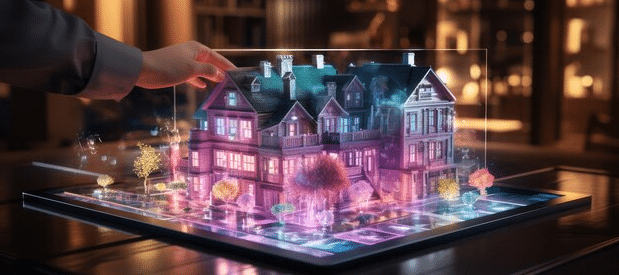The introduction of modern technology into the real estate business has revolutionized the branch in the USA. With such developments, the market is going through a transformation, which increases its effectiveness and relevance for practitioners and users.
These new relative tools and methodologies are surely valuable for the stakeholders as they pave the way for efficiency and interactivity. This article focuses on several implemented technologies that are changing the property market and analyzes the possibilities of their further development.
The Role of Virtual Reality and Augmented Reality

Today there are the trends of virtual reality (VR) and augmented reality (AR) used in property transactions. These technologies present a chance of buying and renting rental properties without physically accessing the property. Potential customers can get virtual guided tours of a property, and even come up with the kind of feel of the property in question.
This eases the process of ensuring little contact is established but, at the same time, saves busy realtors and clients a lot of time. The usefulness has increased since the agents are now able to reach a larger market regardless of geographical barriers or locations thus improving the rate of work.
Streamlined Transactions through Blockchain
Another revolutionary aspect in the property market is blockchain tech. The internet’s introduction is enhancing accountability, ease, and security of financial transactions. Blockchain supports decentralised property listings and also ensures there are records which can never be changed hence little or no frauds which makes the parties to have trust.
The property of decentralization in blockchain also contribute to making more efficient transactions and decrease the middlemen costs which are characteristic for most operations.
Consumers can check the past of objects in the process of purchase, it is possible to make sure that all papers and verifications have been completed. This level of transparency is today attracting more investors into the market, believing that everyone’s transaction and identity is authenticated.
Artificial Intelligence in Property Valuation
This paper seeks to establish how artificial intelligence is transforming property valuation approaches. Conventional measures can be largely paper based and need a lot of intervention from human resource. Using big data analysis, AI algorithms are able to work efficiently utilizing market trend as well as property and economic characteristics to arrive at an accurate appraisal.
This capability provides better pricing options to the users and helps in the right decision-making process regarding investments. Other advancements include the use of AI in chatbots that are proving helpful to customers by providing first-hand access to customer service for long hours, hence improving the level of client satisfaction that organizations receive.
Smart Home Technology
Today’s application of smart home gadgets is stretching the envelope on the contemporary living. Potential consumers are more interested in houses and homes with modern home systems including the lighting systems, thermostat systems and security systems. They help in conservation of energy, and afford a security as well as comfort to the users.
This way, the utilization of IoT devices in home infrastructure enables the user to regulate the home systems from a distance, and also to monitor the usage of energy and save money. It is more advantageous to the buyers who are believed to be sophisticated, income earners and in their middle or working age who prefer convenience and new solutions.
Enhanced Marketing through Data Analytics
It can be seen that conventional marketing methods are not sufficient in the marketing of properties and data analytics is being used as a tool extensively now. Based on the consumers’ behavior and their choice, real estates’ marketers can identify suitable audiences for the advertisements.
This results to improved conversion as well as the advertisement communication endeavors. Big data analysis enables race in detection of new market trends that may suit competition and thus enabling the agents to counter check the competitors.
Working with the customers’ needs in mind, agents create better descriptions, discuss the features that will be pertinent to the target audience, and sell properties in a more effective manner.
Virtual Staging Techniques
Virtual staging is increasingly becoming the new way of presenting an item, especially a property that is up for sale. With the help of modern programs, agents can stage the apartments and houses virtually, which allows saving money though the spaces look empty.
This method is also flexible in creativity and enables the clients come with models of how their future home could look like with different styles. Compared to the real staging, virtual staging does not take a long time to change styles and can be applied to meet different tastes.
This also assists the agents in presenting the features of the property in the best manner possible by being able to focus on the positives where there are perceived drawbacks when the house or space is empty. It can be seen that the digital approach applied to the listings can greatly enhance the attraction of the objects and, thus, the speed of their sale.






